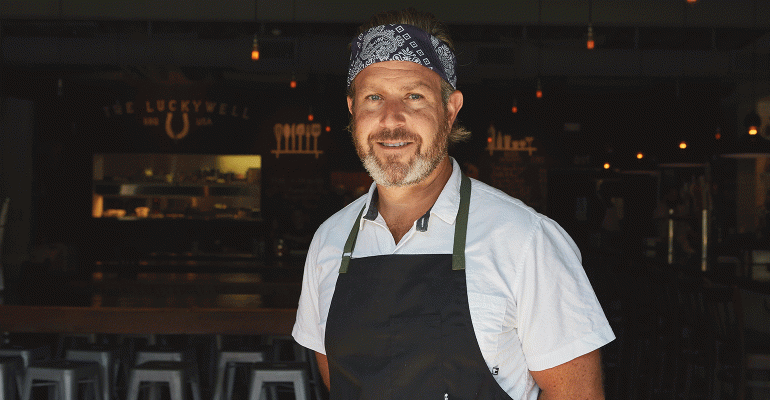The restaurant business is a people business, and chefs and operators tend to be a charitable bunch, whether that means donating time, money or a portion of the day’s profits to local or national causes.
Chad Rosenthal, chef and owner of The Lucky Well, an Ambler, Pa.-based barbecue-and-blues concept, is among chefs adding a charitable component to their restaurants. When Rosenthal’s newest Lucky Well location opens in Philadelphia’s Spring Arts District this summer, it will also feature The Lucky Well Commissary, which will produce a signature dry-rub spice and sauces for the restaurants, as well as train, mentor and employ those struggling to overcome poverty or homelessness in the City of Brotherly Love.
Rosenthal, who was a finalist on the ninth season of “Food Network Star,” discussed his inspiration, challenges and why restaurants need to do more than just serve good food and service.
What’s your vision?
The vision is to open The Lucky Well Commissary connected to the Philadelphia location, a space within the restaurant to create super easy items. My dry rub — Rosie’s Rub — currently gets mixed in Virginia. But I pay way too much for it. We should be doing this for ourselves. Simple recipes. Easy tasks that can be done. We'll set up the Commissary as a separate entity, so my restaurants will purchase products and make sure they’re the same in every location.
What inspired you to create the Commissary?
I love feeding people. I’ve always said that. This is an extension of that. I was asked to feed a homeless shelter at Thanksgiving. I had no clue. I was expecting a place with cardboard boxes … It was a sit-down dinner. I was like, this is so cool. I’d like to do more, but I really don’t have time. [I thought] why can't we create a commissary and hire some of these folks?
Why not just volunteer to do more dinners for those in need? Why build philanthropy into the business?
As a chef and restaurant owner, I work nonstop. I just don’t have the time. The goal is to bring these people in. If they keep showing up, they’ll move into real restaurant positions. It’s really just a place to create opportunity.
You launched a crowdfunding campaign for the Commissary that didn’t reach its $125,000 goal. What happens now?
The Kickstarter didn’t fully fund. We knew it wasn’t going to. The costs on Kickstarter included buying vehicles, a kitchen with a hot line. It led to so many good people, though. But we're still doing it. We raised a portion of it. We are going back to the backers to let them know what we’re going to do. We’ll start it with dry rub…prove the concept. If it works, maybe add other products. I think every restaurant has something they’re making that could be done in the Commissary.
What challenges do you anticipate?
It’s a proven concept, the hiring of ex-homeless people or people in poverty. It might be difficult to find people, but what I do well is I find good people. I really think it could work if you keep it simple.
Is this a model other restaurants should consider?
There’s so many restaurants now, and I feel like everyone needs to set themselves apart. Food and service isn’t good enough anymore.





